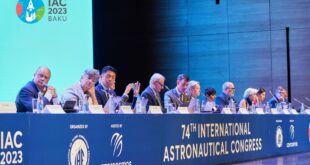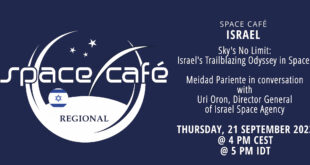By Viktoria Urban

Our Space Cafe WebTalk “33 minutes with Dr Deganit Paikowsky – Evolution of the concept of a Space Club by the space powers” took place on Tuesday, 21st June.
Dr Deganit Paikowsky is experienced in the interface and interrelations between world politics and technological domains, specializing in space, cyber- and emerging technologies. She combines academic research with hands-on experience.
Deganit is a Researcher and Lecturer at the Department of International Relations at the Hebrew University of Jerusalem, and a Non-Resident Scholar at the Space Policy Institute of the Elliott School for Foreign Affairs, George Washington University. She also serves as a Vice President at the International Astronautical Federation (IAF) on behalf of the Israel Space Agency.
Technological Clubs have been around for 300-400 years now. The way she sees these clubs is as institutional, or social institutions among countries, very much linked to the dynamic of power rivalry. Technological Clubs bring together three categories of action: the development of assets and capabilities to gain power, projection of power, and eventually controlling technological diffusion for practices and processes of cooperation and also restrictions.
Today, there are space clubs, cyber clubs, and AI clubs may be forming in the future as well. Each club consists of a small group of very capable countries.
“Usually, these demonstrate the great powers that they have in a specific technological field that is admired by the rest of the world as currencies of power and influence.”
The rest of the world applauds this capability and accepts the perception that connects the power influence status and the technology. Of course, there are at least two different types of clubs: formal clubs and informal clubs. The Space Club, for example, is an informal club as there is no such international organization. The Nuclear Club on the other hand, is a much more structured club, with regulations and binding mechanisms in the international system.
Deganit says that there is a very strong connection and analogy between the Nuclear Club and the Space Club. During the Cold War, the great powers were trying to enforce leadership or attract others to their side by the means of technology to gain influence in a non-aggressive way. The Nuclear Club and the Space Club have the same dynamic in this regard and they are framed in a very similar way. After the development of the assets and capabilities, the great countries project the power, and provide a political context. When it comes to competition between other countries, the great powers get involved in predicting and sometimes also assisting who the winner will be.
The clubs provide different functions to different types of nations: strong nations are established, spacefaring nations who use clubs to reinforce and justify their power. They even take the role of the gatekeepers, because they have the power to either restrict or assist others. Deganit says the Space Club is like a pyramid where nations can slowly climb their way up. As they go higher up, there are fewer actors, however, it is possible to gain more privileges by making more resources available and taking more responsibility.
“The less powerful countries emerging or rising are seeking assimilation to the strong.”
Deganit emphasizes that Isreal’s objective was never about joining a club, it was always about meeting national considerations. Nonetheless, the country is joining a club as it is part of a community of countries engaged in science and technology.
The three key takeaways according to Deganit are first, that the future focus in advancement is on the advancement of the space economy. Space remains a highly political practice, a part of the great power competition. Second, the leadership and membership in the future Space Club will depend on an innovative, scalable and committed industrial base. Therefore, she thinks, it is very important to create sustainable and fruitful connections between the private national community and the State community. Third, from a global perspective, competition is a significant driver but partnerships are the enabler of advanced leadership in space, which is represented in the Space Club.
To listen to the Space Café WebTalk’s insights, you can watch the full program here:
Viktoria Urban, contributing Editor at SpaceWatch.Global: After graduating as a Journalist from Edinburgh Napier University, I am now doing an Astronomy and Planetary Science degree at The Open University (Scotland) which has enhanced my already existing love and enthusiasm for space. I am also a member of and a volunteer for several societies both in Hungary and in the UK and write online content on space for multiple companies as well. I hope my science communication will encourage many to find a job in the space sector, whatever their background and highlight important issues to ensure a sustainable space environment for future generations.
 SpaceWatch.Global An independent perspective on space
SpaceWatch.Global An independent perspective on space




